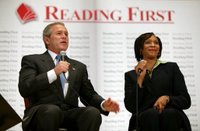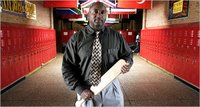Study Hard -- Or "Get Stuck In Iraq," Says Kerry
UPDATE: Apparently Kerry meant to impugn President Bush's study habits, not the military's, but Kerry's gaffe has turned into the big political story of the week. Doh!
Alexander Russo's weekly roundup of the best education news and analysis
 It's not just that the controversy at Galluadet isn't really a K-12 issue that has kept me from wanting to write much about it. Rather, it's the seemingly inexhaustible, wall-to-wall coverage from the mainstream media-- little of it very insightful -- that's made me hesitate.
It's not just that the controversy at Galluadet isn't really a K-12 issue that has kept me from wanting to write much about it. Rather, it's the seemingly inexhaustible, wall-to-wall coverage from the mainstream media-- little of it very insightful -- that's made me hesitate.  On Monday, Eduwonk wrote "I've figured [NCLB reauthorization won't] happen until at least 2009 because neither party really wants its various intra-party divisions over education to spill into the open with the White House in play." Not until 2009, you say? How daring and insightful a prediction. Except that, a month ago, some other blogger wrote: "NCLB doesn't get reauthorized in 07 OR 08, but instead is left for a new administration."
On Monday, Eduwonk wrote "I've figured [NCLB reauthorization won't] happen until at least 2009 because neither party really wants its various intra-party divisions over education to spill into the open with the White House in play." Not until 2009, you say? How daring and insightful a prediction. Except that, a month ago, some other blogger wrote: "NCLB doesn't get reauthorized in 07 OR 08, but instead is left for a new administration."
 There's a long history in Washington of "revising and extending" your remarks -- that is, going back and changing what you said the first time, without necessarily admitting the need for correction -- and the Washington Post's Jay Mathews illustrates that that phrase in his online column from last week reflecting on how he (and most other education reporters) covered the Loveless/Brookings study that came out a couple of weeks ago. (You remember, the one about kids who didn't like math doing better at it.)
There's a long history in Washington of "revising and extending" your remarks -- that is, going back and changing what you said the first time, without necessarily admitting the need for correction -- and the Washington Post's Jay Mathews illustrates that that phrase in his online column from last week reflecting on how he (and most other education reporters) covered the Loveless/Brookings study that came out a couple of weeks ago. (You remember, the one about kids who didn't like math doing better at it.) Kudos to the AFTies for finding last night's Nightline segment on HBO's "The Wire." The scene at left shows Prezbo, the new teacher (and inept former police officer) getting a bit of the inside scoop from veteran colleagues, who warn him among other things not to bother trying to get students to not chew gum in class. Check out the Nightline segment here. Check out what AFT Michele has to say about it here.
Kudos to the AFTies for finding last night's Nightline segment on HBO's "The Wire." The scene at left shows Prezbo, the new teacher (and inept former police officer) getting a bit of the inside scoop from veteran colleagues, who warn him among other things not to bother trying to get students to not chew gum in class. Check out the Nightline segment here. Check out what AFT Michele has to say about it here.
 Just when you think that maybe the folks over at the AFT Blog have lost their mojo since John left, they pull out something like this post about the behavior of boys with girlish names: Boys Named Sue. And for those who may have forgotten the lyrics (by Shel Silverstein): "My daddy left home when I was three/And he didn't leave much to ma and me/Just this old guitar and an empty bottle of booze./Now, I don't blame him cause he run and hid/ But the meanest thing that he ever did/ Was before he left, he went and named me "Sue."
Just when you think that maybe the folks over at the AFT Blog have lost their mojo since John left, they pull out something like this post about the behavior of boys with girlish names: Boys Named Sue. And for those who may have forgotten the lyrics (by Shel Silverstein): "My daddy left home when I was three/And he didn't leave much to ma and me/Just this old guitar and an empty bottle of booze./Now, I don't blame him cause he run and hid/ But the meanest thing that he ever did/ Was before he left, he went and named me "Sue."
 Saying that the decision announced yesterday "doesn't settle the matter," a press release from Democratic Congressman George Miller late Monday proclaimed that "No Bush administration official has yet been held accountable for the decision to hire Williams and other commentators to routinely promote the federal No Child Left Behind Act on television, radio and in newsprint without revealing to audiences that they were being paid by the government to do so." Oh, and he also wants $240K more paid back.
Saying that the decision announced yesterday "doesn't settle the matter," a press release from Democratic Congressman George Miller late Monday proclaimed that "No Bush administration official has yet been held accountable for the decision to hire Williams and other commentators to routinely promote the federal No Child Left Behind Act on television, radio and in newsprint without revealing to audiences that they were being paid by the government to do so." Oh, and he also wants $240K more paid back. Democrats are worrying themselves silly about some sort of October Surprise from the White House that would turn the midterm elections away from them, when they probably should be worrying more about shooting themselves in the foot. This, sad to say, is probably all that the administration can muster: Money starts flowing in teacher bonus program (CNN). Not much, I know.
Democrats are worrying themselves silly about some sort of October Surprise from the White House that would turn the midterm elections away from them, when they probably should be worrying more about shooting themselves in the foot. This, sad to say, is probably all that the administration can muster: Money starts flowing in teacher bonus program (CNN). Not much, I know. Today and Thursday, Secty Spellings heads out to do what I'm sure are being billed as nonpolitical appearances with Republican House members in hotly contensted races in Ohio and Indiana, including Cong. Steve Chabot at the Cincy Zoo Academy, Ralph Regula at the Southmore MS in Columbus, and Cong. Chris Chocola at Sycamore ES in Kokomo Indiana.
Today and Thursday, Secty Spellings heads out to do what I'm sure are being billed as nonpolitical appearances with Republican House members in hotly contensted races in Ohio and Indiana, including Cong. Steve Chabot at the Cincy Zoo Academy, Ralph Regula at the Southmore MS in Columbus, and Cong. Chris Chocola at Sycamore ES in Kokomo Indiana. "We demonize Mark Foley but ignore the industries medicating children and making them fat, and even open our schools to people trying to kill them -- military recruiters," writes fierce, foul-mouthed, and funny Bill Maher in Salon (The real menace to American kids). "The fact is, there are a lot of creepy middle-aged men out there lusting for your kids. They work for MTV, the pharmaceutical industry, McDonald's, Marlboro and K Street."
"We demonize Mark Foley but ignore the industries medicating children and making them fat, and even open our schools to people trying to kill them -- military recruiters," writes fierce, foul-mouthed, and funny Bill Maher in Salon (The real menace to American kids). "The fact is, there are a lot of creepy middle-aged men out there lusting for your kids. They work for MTV, the pharmaceutical industry, McDonald's, Marlboro and K Street."
 Like many rock stars, Richard ("Ricky Lee") Colvin has three names, wears an earring, and used to hang out on the West Coast. Unlike the rest of those guys, Colvin used to be the lead education writer at the LA Times and now heads the Hechinger Institute, the Columbia University-based
Like many rock stars, Richard ("Ricky Lee") Colvin has three names, wears an earring, and used to hang out on the West Coast. Unlike the rest of those guys, Colvin used to be the lead education writer at the LA Times and now heads the Hechinger Institute, the Columbia University-based  RLC: The EWA is a membership organization. Such an organization is one of the hallmarks of a professional activity that requires specialized knowledge or training. Hechinger is not a membership organization. It offers training in various forms—publications, seminars and, soon, our redesigned website...As to your question of whether there’s room for two organizations, we usually turn people away from our seminars because we like to keep them small enough to foster rich discussions. I don’t think EWA has any trouble attracting participants either. So, the hunger for more knowledge and training is strong.
RLC: The EWA is a membership organization. Such an organization is one of the hallmarks of a professional activity that requires specialized knowledge or training. Hechinger is not a membership organization. It offers training in various forms—publications, seminars and, soon, our redesigned website...As to your question of whether there’s room for two organizations, we usually turn people away from our seminars because we like to keep them small enough to foster rich discussions. I don’t think EWA has any trouble attracting participants either. So, the hunger for more knowledge and training is strong. This week's Carnival of Education is up over at contributor extraordinaire Margaret Paynich's site (Poor, Starving, College Student). Check it out -- including my post from last week about Samuel Freedman's overheated NCLB column.
This week's Carnival of Education is up over at contributor extraordinaire Margaret Paynich's site (Poor, Starving, College Student). Check it out -- including my post from last week about Samuel Freedman's overheated NCLB column. Higher education writer Anya Kamenetz is a big deal at a very young age -- largely for her Village Voice columns and her book, Generation Debt.
Higher education writer Anya Kamenetz is a big deal at a very young age -- largely for her Village Voice columns and her book, Generation Debt. Fair or not, education research isn't held in very high esteem.
Fair or not, education research isn't held in very high esteem. As you can imagine, I wanted to hear more when I saw Bob Sweet's rebuttal to Michael Grunwald's Washington Post article on Reading First from yesterday (Former House Staffer Takes On Washington Post Reading First Story), and wrote each of them asking if they wanted to talk.
As you can imagine, I wanted to hear more when I saw Bob Sweet's rebuttal to Michael Grunwald's Washington Post article on Reading First from yesterday (Former House Staffer Takes On Washington Post Reading First Story), and wrote each of them asking if they wanted to talk. The most striking and problematic things about this week's Samuel Freedman column (about a handful of highly educated teachers in California who are told they're not "highly qualified" and decide to quit) are that the column (a) focuses on dramatic and relatively unusual exceptions rather than the widespread problems that need addressing, (b) blames NCLB for drumming out star teachers more than teacher training programs for their poor quality, and (c) -- perhaps most important of all -- may represent a highly exaggerated or even inaccurate interpretation of HQT rules in NCLB and California.
The most striking and problematic things about this week's Samuel Freedman column (about a handful of highly educated teachers in California who are told they're not "highly qualified" and decide to quit) are that the column (a) focuses on dramatic and relatively unusual exceptions rather than the widespread problems that need addressing, (b) blames NCLB for drumming out star teachers more than teacher training programs for their poor quality, and (c) -- perhaps most important of all -- may represent a highly exaggerated or even inaccurate interpretation of HQT rules in NCLB and California. I'm told that by the folks at the Ed Trust that there are fast track and intern programs that take as little as six weeks for certification.
I'm told that by the folks at the Ed Trust that there are fast track and intern programs that take as little as six weeks for certification.
 Now this is something that I don't think the Levine report from last month ever really got to: the large and growing proportion of the degrees that teachers, principals, and admins use to get ahead on district salary scales -- and improve their skills, of course. That's what makes Kevin Carey's recent mini-report on ed school graduates so interesting -- in essence it shows how big Nova, Argosy, Capella, and other nontraditional and often online programs have become (The No. 1 Graduate School of Education?). After all, the thinking goes, if you get the same salary bump whether you go to Columbia or Capella, why not go to the cheaper, more flexible school? And, given the sorry state of many traditional education schools, it's not entirely clear that it's not the right decision.
Now this is something that I don't think the Levine report from last month ever really got to: the large and growing proportion of the degrees that teachers, principals, and admins use to get ahead on district salary scales -- and improve their skills, of course. That's what makes Kevin Carey's recent mini-report on ed school graduates so interesting -- in essence it shows how big Nova, Argosy, Capella, and other nontraditional and often online programs have become (The No. 1 Graduate School of Education?). After all, the thinking goes, if you get the same salary bump whether you go to Columbia or Capella, why not go to the cheaper, more flexible school? And, given the sorry state of many traditional education schools, it's not entirely clear that it's not the right decision. There's nary a mention of the daily tests and exams teachers themselves impose on students, which are more common and in many cases more stressful on students. And the piece ignores until the very end fundamental political reality that taxpayers and lawmakers are unwilling to fund schools without some measures of performance, however imperfect.
There's nary a mention of the daily tests and exams teachers themselves impose on students, which are more common and in many cases more stressful on students. And the piece ignores until the very end fundamental political reality that taxpayers and lawmakers are unwilling to fund schools without some measures of performance, however imperfect. Is anyone else but me wondering how the mainstream press missed the story of how Reading First was being abused? Politically and substantively, it's arguably the biggest education story of the year. It's got politics, greed, and ideology galore-- not to speak of all those little kids taking DIBELS tests all day. And the program's prescriptiveness was an open secret in Washington and the states.
Is anyone else but me wondering how the mainstream press missed the story of how Reading First was being abused? Politically and substantively, it's arguably the biggest education story of the year. It's got politics, greed, and ideology galore-- not to speak of all those little kids taking DIBELS tests all day. And the program's prescriptiveness was an open secret in Washington and the states. Looking to Tuesday's school safety summit (which is now -- talk about overkill -- apparently going to include not only the President but also the First Lady and Attorney Genera), this weekend's NPR show On The Media included a segment on how the media may be overblowing the recent spate of school violence and even contributing to copycat crimes.
Looking to Tuesday's school safety summit (which is now -- talk about overkill -- apparently going to include not only the President but also the First Lady and Attorney Genera), this weekend's NPR show On The Media included a segment on how the media may be overblowing the recent spate of school violence and even contributing to copycat crimes. Given the alternatives -- the Foley scandal or the war in Iraq -- Administration officials are understandably eager to change the subject to NCLB and school safety.
Given the alternatives -- the Foley scandal or the war in Iraq -- Administration officials are understandably eager to change the subject to NCLB and school safety. Earlier this week, I finally had the chance to sit down and talk with Joe Williams, the former Milwaukee and New York City education reporter (and author and blogger), and two things struck me -- besides the fact that he basically seems like a smart and decent guy:
Earlier this week, I finally had the chance to sit down and talk with Joe Williams, the former Milwaukee and New York City education reporter (and author and blogger), and two things struck me -- besides the fact that he basically seems like a smart and decent guy: Over at Eduwonk, Andy Rotherham (left) seems to be taking an undue amount of pleasure in the current struggles of Fordham's Mike Petrilli to push national testing (and weighted student funding, I'd add) while simultaneously defending Reading First from being eviscerated (Petrilli's Two-Front Testing War).
Over at Eduwonk, Andy Rotherham (left) seems to be taking an undue amount of pleasure in the current struggles of Fordham's Mike Petrilli to push national testing (and weighted student funding, I'd add) while simultaneously defending Reading First from being eviscerated (Petrilli's Two-Front Testing War). Now, I know and have worked on projects for both of these guys, and I'm all for taking perverse pleasure in others' difficulties (especially for the high and mighty). But Petrilli (right) isn't puffing himself up here. He's putting himself on the line. With three years at the USDE, he's got more credibility than most. And the organization he works for -- love it or hate it -- is pushing strong, clear ideas on the K12 front and actually working to implement them. Not everyone can say those things.
Now, I know and have worked on projects for both of these guys, and I'm all for taking perverse pleasure in others' difficulties (especially for the high and mighty). But Petrilli (right) isn't puffing himself up here. He's putting himself on the line. With three years at the USDE, he's got more credibility than most. And the organization he works for -- love it or hate it -- is pushing strong, clear ideas on the K12 front and actually working to implement them. Not everyone can say those things.
 The carnival of education blogs is up over at Current Events, including blog posts from around the states.
The carnival of education blogs is up over at Current Events, including blog posts from around the states.

 In Many Public Schools, the Paddle Is No Relic
In Many Public Schools, the Paddle Is No Relic